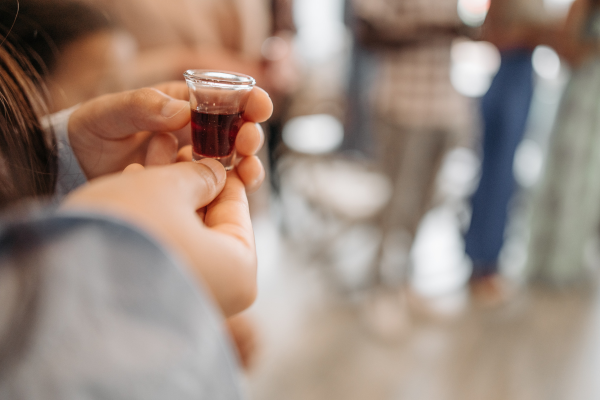Taste & Seeಮಾದರಿ

The Table at the Center of History

It was the night before Jesus’ crucifixion and the mood around the table was somber. The Passover meal was underway in the Upper Room, and Judas had left the table to betray the Lord. The elements before the disciples were familiar. For 1,500 years the Jewish people had commemorated their exodus out of Egypt and out of slavery with this meal.
The Passover was rich with themes of slavery, judgment, deliverance, and redemption, and as God would have it, those themes were playing out in real time around their table.
Now as they were eating, Jesus took bread, and after blessing it broke it and gave it to the disciples, and said, “Take, eat; this is my body.” And he took a cup and when he had given thanks he gave it to them, saying, “Drink of it, all of you, for this is my blood of the covenant, which is poured out for many for the forgiveness of sins.” Matthew 26:26-27
Maybe this passage is so familiar that it no longer registers on the mic drop scale. But these statements were earth-shattering to the disciples. The elements of their Passover meal were rich with meaning and tradition, and Jesus was reassigning them before their very eyes.
Four cups of wine were offered during the course of the Passover meal which represented the four phases of God’s promise of deliverance in Exodus 6:6-7. Each cup represented a statement from God, “I will bring you out,” “I will deliver you,” “I will redeem you,” and “I will take you to be my people.” It was after the third cup, and God’s promise to redeem, that Jesus reassigned the meaning of the bread and cup.
Jesus was unapologetically messing with fifteen centuries of tradition and national identity. The Passover was their oldest institution and Jesus was declaring that he was the fulfillment of it. God had delivered in part at the Red Sea, but eternal deliverance was happening the next morning on Calvary’s hill. Now was the time for the new covenant.
Even though they didn’t understand the significance of all Jesus was doing, they knew that the elements Jesus spoke of were symbolic, not his actual body and blood. After all, he was still right there in their midst. But what a gruesome picture he painted of eating his flesh and drinking his blood! As outrageous as his language must have seemed, nothing less would have sufficed for what was about to take place.
Reassigning the meaning of these common elements of bread and wine reverberate to this very day. The Passover table became the Lord’s Supper table, and that table stands at the center of history. Now 2,000 years later, Christians from every tribe, nation, people group, and language, still feast at this table. Even though we partake of it locally, we join saints all over the world and share in its blessings universally.
Do you see the bread and the cup as a meal that nourishes both your body and soul? Don’t be fooled by its humble appearance. It’s not magical, nor does it save anyone. It’s a meal for Christians who are warned not to take it in an unworthy manner.
This is the meal of ages and the culmination of God’s redemptive plan. He wants us to experience it. Drink, chew, and swallow it, so that it becomes a part of who we are. The themes and the flavors of this meal are rich. Come and partake of it and be eternally nourished and blessed.
Food for Thought
- When Jesus instituted the first Communion or the Lord’s Supper, he was directing the disciples to look back in history to the Passover, and forward to the cross. How does partaking of the elements do the same for us today? What are we looking back on and forward to?
- Eating and drinking are actions we repeat every day so that we can be nourished, have energy for God’s work, and live. Why do we need to continually repeat the Lord’s Supper? How does it nourish us for eternity?
ದೇವರ ವಾಕ್ಯ
About this Plan

Meals nourish us both body and soul. In this 7-day series, you’ll visit various tables in the Bible and discover what they say about our spiritual hunger and thirst. From that fateful bite in the garden to the final feast in Revelation, satisfaction comes from a right relationship with our Creator. You’re invited to a feast. Pull up a chair and taste and see that the Lord is good.
More
ವೈಶಿಷ್ಟ್ಯದ ಯೋಜನೆಗಳು

The Way to Follow Jesus According to the Gospel of Luke

Here Be Dragons

Ears to Hear (S3-E7)

In Her Image: Character Study of the Proverbs 31 Woman

Multiplying the Gospel // Gospel X - Multiplying the Message

The Bible for Young Explorers: Matthew

Now Over Next

Decide to Thrive: Youth Edition

Daily Bible Reading— February 2025, God’s Strengthening Word: Sharing God's Love
